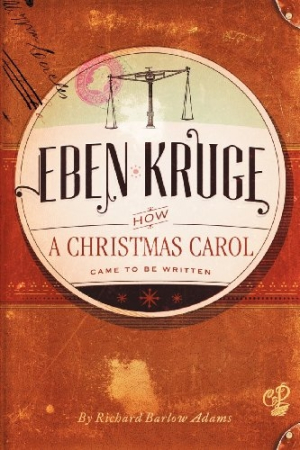
Eben Kruge
How "A Christmas Carol" Came to be Written
West Point graduate and active alumnus Richard Barlow Adams is the author of a prior novel, The Parting, about the West Point class of 1861. Set in the same geographical area of New York State, his latest novel, Eben Kruge, offers a new perspective on English author Charles Dickens’s 1842 visit to America.
Adams creates a clever scenario involving Dickens and a man named Eben Kruge, suggesting that their encounter strongly influenced the creation of A Christmas Carol. “Is it entirely unreasonable,” the author inquires, that the story he presents here “could have actually happened?” The answer lies in Adams’s ability to write convincingly and well. He relates a tale so thoroughly researched and credibly delivered that readers may be tempted to believe it all.
Adams introduces Dickens as a young man visiting New York’s Hudson Valley during an extended trip with his wife, a documented tour that the two actually did take after the writer had developed a following among both English and American readers. Tasked with compiling observations for his American Notes account, Dickens is at the end of his five-month tour, and as Adams suggests, is more than ready to return to London.
“These Americans have worn me out with their attentions and expectations,” Dickens complains to his wife, regretting even having agreed to produce the promised volume about America. “I would give an eyetooth for a truly distinctive spirit to enliven a story,” he mentions. When the proprietor at his hotel tells him about an unusual man named Eben Kruge, his curiosity is piqued and his imagination suddenly reawakened. Dickens pursues the mysterious Mr. Kruge, and Adams purports that it is the tale that follows that leads Dickens to write A Christmas Carol.
Eben Kruge is fiction, although it reads compellingly like nonfiction. Adams’s writing has a formal tone, and it is easy to accept most of what he writes as truth. He supplies carefully researched historical detail, interjecting accounts of actual events into conversations among his characters. His information is admirably accurate, specifically concerning events of the American Revolution, George Washington’s activities in the Hudson Valley at the end of the war, various topics of local legend, and the life of Charles Dickens himself. Adams’s skill at seamlessly incorporating verifiable facts into his story often renders the transitions into fiction unnoticeable.
Between his dialogue and his descriptions, Adams presents a well-planned story that moves almost effortlessly. The text has been well edited, reflecting the care of a proficient writer and offering a stellar example of finely polished prose. Eben Kruge is an intriguing book, historically and creatively. Adams offers a fascinating and thought-provoking tale for anyone and everyone who has ever enjoyed reading Dickens. It is possible, however, that the volume’s title is a bit too vague. Those who miss the reference to Dickens in the subtitle, interpreting Christmas Carol more generally, may pass the book by, never realizing what they are missing.
Reviewed by
Cheryl Hibbard
Disclosure: This article is not an endorsement, but a review. The publisher of this book provided free copies of the book and paid a small fee to have their book reviewed by a professional reviewer. Foreword Reviews and Clarion Reviews make no guarantee that the publisher will receive a positive review. Foreword Magazine, Inc. is disclosing this in accordance with the Federal Trade Commission’s 16 CFR, Part 255.
